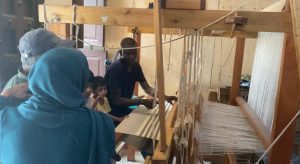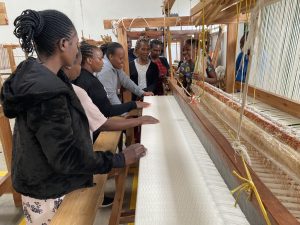How does one seemingly mundane pillow, rug, or bedspread translate into a family’s meals for the week and a heightened position for women in the household? In Kenya, the significance of the textile industry is seen all throughout the country, from the crowded stalls in Nairobi’s Maasai Markets to the vendors lining streets along the coast. This industry has one of the highest appeals to foreigners visiting Kenya. Oftentimes, when I walk past a textile shop, I find all or almost all employees to be women. Indeed, the textile industry seems to be predominantly made up of women.
For women from low-income backgrounds, the textile industry can present more than just a source of employment. It can also present them and their families with resiliency.
I learned the significance of the textile industry for women’s economic empowerment when I visited the coastal city of Mombasa this past weekend. There, I booked a guided tour, and my tour guide Humphrey took me to the Imani Collective workshop. Humphrey explained to me the purpose of the American-backed project: to empower local female artisans through paid employment and market support. At the entrance, I saw signs with the words “This is empowerment.” Upon entering, I was surprised to see striking similarities between this project and Shield of Faith’s embroidery activities. Despite Mombasa and Nairobi being on opposite ends of the country, separated by a 6-hour long train ride, the ideas behind women’s economic empowerment are the same. There were several looms, where artisans weave cotton yarn into intricate patterns, producing all sorts of gorgeous fabrics. Just one week prior, I visited a woven textile workshop in Nairobi’s Industrial Area with Shield of Faith’s members to gauge opportunities for paid employment.
Seeing the success of the Imani Collective in Mombasa confirmed the fact that the textile industry does serve as a viable and sustainable source of employment for women. It also allows women to develop their skills and pay off some of their household expenses. Speaking with Shield of Faith’s members at the textile workshop, I learned that some of them have used the money generated from the project’s embroidery activities to pay their children’s school fees or buy beds for themselves and their families. Shield of Faith’s members already have strong embroidery skills. If given the chance to obtain employment in the textile industry, with the opportunities it presents, their potential is unlimited. Shield of Faith understands that. And it’s clear, from visiting the Imani Collective in Mombasa, that others around the world understand it, too.
Posted By Caitlin Mittrick
Posted Aug 1st, 2023



